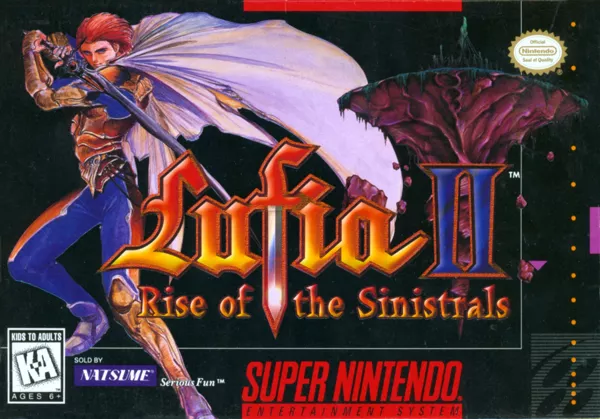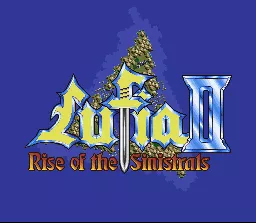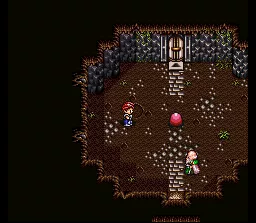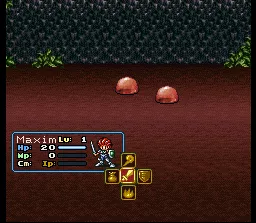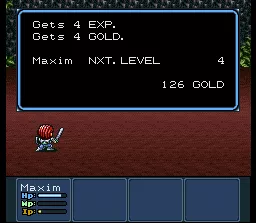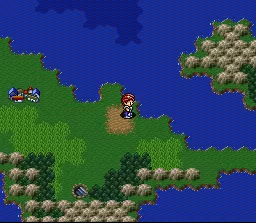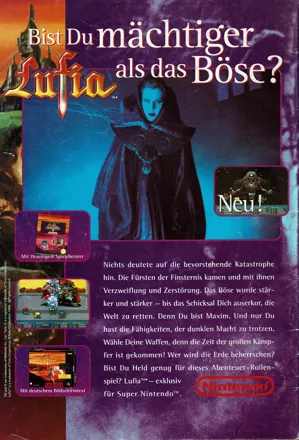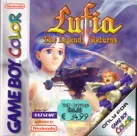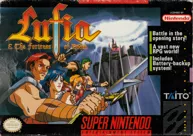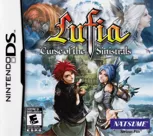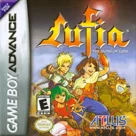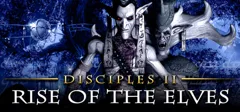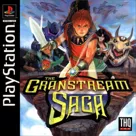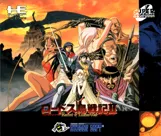Lufia II: Rise of the Sinistrals
Description official description
Lufia II: Rise of the Sinistrals is a prequel to Lufia & the Fortress of Doom. Its events take place ninety-nine years prior to it, and it explains the origin of the series' antagonists, the group of super-humans known as the Sinistrals. The player controls the ancestor of the first game's protagonist, the swordsman Maxim. After having encountered a mysterious woman named Iris, Maxim goes on a journey to find other heroes who would help him to stop the Sinistrals from destroying the world.
Like the first game, Rise of the Sinistrals is a Japanese-style turn-based RPG with many puzzle elements thrown in. The game makes extensive use of puzzles in its dungeon layouts; various items and accessories must be used to solve them. It also features a "Capsule Monsters" system; monsters can be summoned to fight alongside the party in battles. They would evolve when fed weapons, armor, or special fruits. Unlike in the first game, there are no random battles in the dungeons: all the enemies are visibly moving on-screen.
Spellings
- エストポリス伝記II - Japanese spelling
Groups +
Screenshots
Promos
Credits (SNES version)
13 People
| Scenario Designer | |
| Lead Programmer | |
| Battle Programmer | |
| Camp Programmer | |
| Monster Designer | |
| Dungeon Designer | |
| Character Designer | |
| City Designer | |
| Music Composer | |
| Map Constructor | |
| Casino Programmer | |
| X-LION Engineer | |
| Director |
Reviews
Critics
Average score: 86% (based on 12 ratings)
Players
Average score: 4.0 out of 5 (based on 38 ratings with 3 reviews)
What an improvement from the first release
The Good
The flexibility in the battle system, you can attack any monster. If you are using magic, you can use it against one monster or all of them or three of them, there is no boundary unlike many RPGs. The IP factor that is presented in this game also helps if you use it. Monsters also have weaknesses to certain weapons in the game, and more damage is done to the monsters with that certain weapon. Yes Dual Blade really helps out at the end of the game unlike in the first release.
The scenario and plot are great, once again.
You can see the monsters in caves, so if you want to avoid them, you can. This means there is no surprise except for on the main field.
The sound composition and programming that is done with this game is superior to that of the first Lufia. The tracks are not as boring and repetitive.
The Bad
Graphically, this game does not cut it out, it looks more like a typical early SNES game, it does not show the prowess of graphics that is in most later games released for the SNES.
Some people find that the puzzles inside the dungeons are too frustrating, considering they do not always mean something in the game, youll just walk into a room with a puzzle in order to advance.
The Bottom Line
This game is a gem for anyone that loves to solve the mini puzzles in an RPG, because this game serves it well, and you have to really use your mind on these puzzles.
SNES · by Scott G (765) · 2005
FOR HEAVEN'S SAKE, PLAY THIS GAME
The Good
The characters rock, and the story line was GOOD.
The Bad
Nothing.
The Bottom Line
It's a good, good, game. So here's my advice.. PLAY IT. Oh, and the puzzles are hard, but it really passes your time solving them.
SNES · by frances mach (7) · 2004
The Good
I can't write about Lufia II without talking about my past: this is the first RPG I really loved. Many high-quality traditional JRPGs were released on SNES, but in Germany we only received action RPGs like Secret of Mana and the mediocre Mystic Quest Legend. You can't imagine my amazement when I played this game (I was probably 12/13): characters with personality, puzzles, varied dungeons, interesting turn-based combat - it blew my mind! To make a long story short: when reading this review, keep in mind that my judgment is very much clouded by nostalgia.
After playing it again in early 2021, I noticed that each game element has its flaws, but as a whole it works almost perfectly. Lufia II has a very good flow: no story segment and no dungeon is so long that it gets on your nerve. The game is also short: according to the in-game display it took me a little bit more than 20 hours to get through - in modern JRPGs this covers barely the prologue. This works in its favor, because otherwise the repetition (more on that later) would make it boring. However, I only played the main plot; there is a lot of side content available which can lengthen the game considerably.
The other area the game shines at are its characters: the main protagonist and his NPC colleagues have actual personalities and character development. It's not Baldur's Gate II, of course, but there is still a good amount of NPC banter to enjoy. I also appreciate that the town folks change dialogue depending on the state of the plot. Those are still mostly uninteresting one-liners, but later games such as The Legend of Heroes: Trails in the Sky will utilize this aspect in perfection. However, some character development felt not organic enough. For example (a mild mid-game spoiler follows): about a third into the game, the protagonist marries. The game does try to establish his relationship with the bride previously, but it still feels almost out of nowhere.
Most dungeons don't only feature many enemies to fight, but also have an equivalent amount of puzzles to solve. While there are a few stupid puzzles here and there and they rely a bit too much on switches, overall I appreciated the variety between combat and puzzles. I especially noticed this during the last few dungeons, which are almost exclusively combat oriented: I missed the puzzles and was almost bored. I also have to positively note the absence of random combat inside the dungeons.
The Bad
I praised the characters, but the plot is weak. It is just a standard "hero saves the world" story and the villains (with one exception) are boring, naturally evil beings. There are a few interesting elements, for example the game actually shows how the villains kill off innocent people or try to enslave all young women of a town, but those are always just local happenings.
The game progression is also too repetitive: you enter a town, learn of their problem, solve it by entering the nearest dungeon, the path to the next town is opened, repeat. Thankfully the local plots are varied and short enough that this never becomes a big problem.
The balance is a bit off. I felt a few of puzzles were unreasonably hard compared to the rest (however, this may be subjective and is an inherent problem of puzzle games) and the combat difficulty was too easy. The game has a lot of combat options: you have equipment with various abilities, you have AI controlled monsters by your side which you can build up, you have magic, you have special consumables - but I never needed to utilize them to beat the game. I did not grind and I only spent a reasonable time on character development and still almost no enemy (especially not the big bads in the end which are actually among the easiest bosses) did pose a challenge. The only difficulty are the relatively low amount of save points during dungeons, which means you need to conserve your resources.
The Bottom Line
Does Lufia II hold up against Final Fantasy VI or Chrono Trigger? No, because it does everything a little bit worse than those juggernauts. But despite its flaws, all elements of Lufia II come together and form a very enjoyable, traditional JRPG. I am confident enough to recommend it to genre fans which don't have my nostalgia filter.
SNES · by Patrick Bregger (311080) · 2021
Analytics
Related Sites +
-
Lufia World
Lots of information about the entire Lufia series can be found here. -
OC ReMix Game Profile
Fan remixes of music from Lufia II: Rise of the Sinistrals. -
Open Directory's Lufia II Category
Listing of Lufia II-related sites on the Open Directory.
Identifiers +
Contribute
Are you familiar with this game? Help document and preserve this entry in video game history! If your contribution is approved, you will earn points and be credited as a contributor.
Contributors to this Entry
Game added by Suicide Squad.
Additional contributors: Apogee IV, chirinea, Sciere, Joshua J. Slone, Dae, Thomas Thompson.
Game added June 11, 2002. Last modified January 10, 2025.


